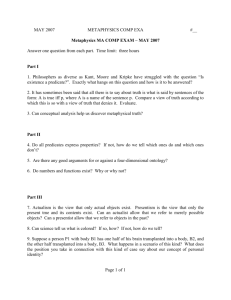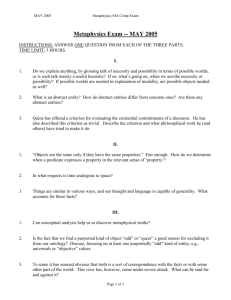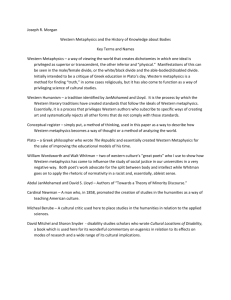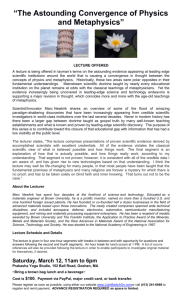Against Philosophical Appeasement
advertisement
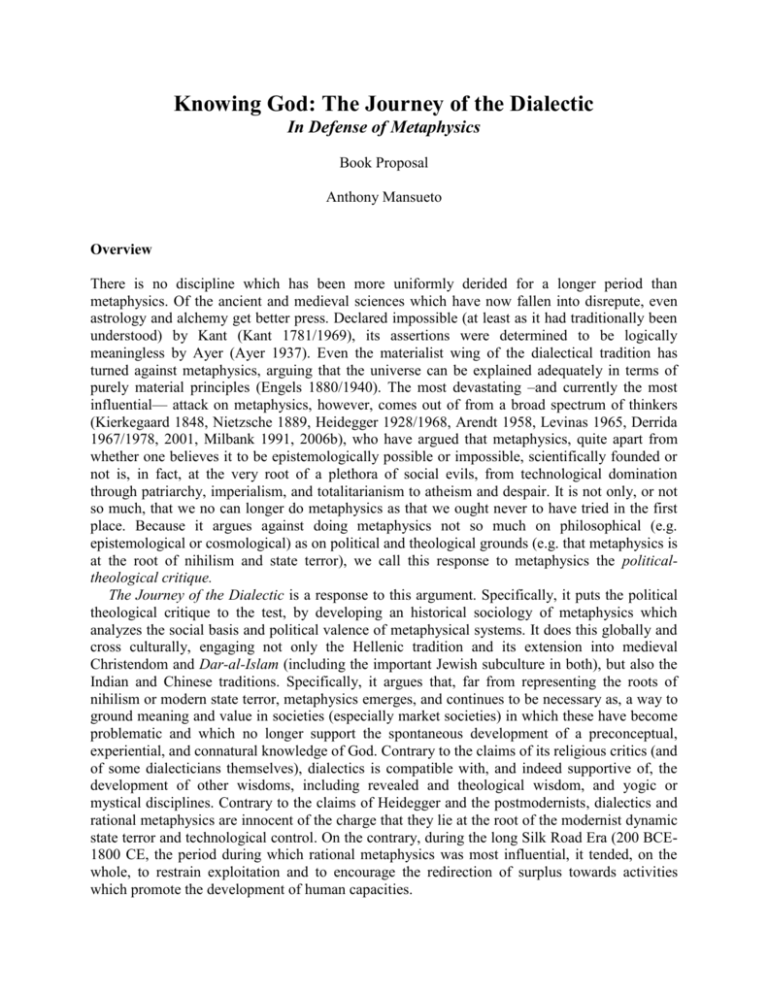
Knowing God: The Journey of the Dialectic In Defense of Metaphysics Book Proposal Anthony Mansueto Overview There is no discipline which has been more uniformly derided for a longer period than metaphysics. Of the ancient and medieval sciences which have now fallen into disrepute, even astrology and alchemy get better press. Declared impossible (at least as it had traditionally been understood) by Kant (Kant 1781/1969), its assertions were determined to be logically meaningless by Ayer (Ayer 1937). Even the materialist wing of the dialectical tradition has turned against metaphysics, arguing that the universe can be explained adequately in terms of purely material principles (Engels 1880/1940). The most devastating –and currently the most influential— attack on metaphysics, however, comes out of from a broad spectrum of thinkers (Kierkegaard 1848, Nietzsche 1889, Heidegger 1928/1968, Arendt 1958, Levinas 1965, Derrida 1967/1978, 2001, Milbank 1991, 2006b), who have argued that metaphysics, quite apart from whether one believes it to be epistemologically possible or impossible, scientifically founded or not is, in fact, at the very root of a plethora of social evils, from technological domination through patriarchy, imperialism, and totalitarianism to atheism and despair. It is not only, or not so much, that we no can longer do metaphysics as that we ought never to have tried in the first place. Because it argues against doing metaphysics not so much on philosophical (e.g. epistemological or cosmological) as on political and theological grounds (e.g. that metaphysics is at the root of nihilism and state terror), we call this response to metaphysics the politicaltheological critique. The Journey of the Dialectic is a response to this argument. Specifically, it puts the political theological critique to the test, by developing an historical sociology of metaphysics which analyzes the social basis and political valence of metaphysical systems. It does this globally and cross culturally, engaging not only the Hellenic tradition and its extension into medieval Christendom and Dar-al-Islam (including the important Jewish subculture in both), but also the Indian and Chinese traditions. Specifically, it argues that, far from representing the roots of nihilism or modern state terror, metaphysics emerges, and continues to be necessary as, a way to ground meaning and value in societies (especially market societies) in which these have become problematic and which no longer support the spontaneous development of a preconceptual, experiential, and connatural knowledge of God. Contrary to the claims of its religious critics (and of some dialecticians themselves), dialectics is compatible with, and indeed supportive of, the development of other wisdoms, including revealed and theological wisdom, and yogic or mystical disciplines. Contrary to the claims of Heidegger and the postmodernists, dialectics and rational metaphysics are innocent of the charge that they lie at the root of the modernist dynamic state terror and technological control. On the contrary, during the long Silk Road Era (200 BCE1800 CE, the period during which rational metaphysics was most influential, it tended, on the whole, to restrain exploitation and to encourage the redirection of surplus towards activities which promote the development of human capacities. Modernity, I argue, emerged out of a very specific metaphysics which developed at the end of the middle ages as a reflex of and support for the emergence of sovereign nation states and of generalized commodity production. The metaphysical systems of the Silk Road Era were analogical: they regarded the difference between the universe and its first principle as qualitative and our relationship to the first principle as one of participation. The new metaphysics which emerged in the late middle ages was univocal: it regarded the difference between the universe and the first principle as merely quantitative. Initially this was understood to require an attitude of radical submission –the doctrine of Augustinian and especially Reformed Christianity and Asharite Islam. But the retheorization of God as an infinitely powerful being in turn opened up the possibility of a new civilizational ideal, one centered on transcending finitude and thus actually achieving divinity by means of scientific and technological progress. The attack on the metaphysics is, in effect, a cover for the univocal metaphysics which has become embedded in what modernity calls science and technology, and is the precondition for “liberating” both the market and the state from transcendental principles of meaning and value and from the sapiential authorities, religious or philosophical, who are the guardians of those principles. Meanwhile, in a kind of counter-reaction to this new univocal metaphysics, Radical Aristotelians and their descendants from Spinoza through Hegel and the young Marx and their interpreters, while retaining an analogical metaphysics, advanced their own strategy for innerworldly deification centered on philosophical wisdom and revolutionary political practice. This strain of the modern dialectical tradition may be misguided, in that contingency can never be overcome through innerworldly activity, but it cannot be blamed for modern nihilism and state terror. On the contrary, it formed the theoretical foundation for the dissident humanistic strain within the socialist and communist movements. Finally, metaphysics in the narrower sense of the tradition deriving from Socrates, Plato, and Aristotle, far from being a “Eurocentrist” ideology, is simply Europe’s contribution to a much broader dialogue among various metaphysical schools which includes the Hindu darshanas, the various Buddhist philosophical schools, Taoism, and Confucianism, among other traditions. Indeed, given the role of Judaism and Islam in the development of the dialectical tradition through the work of Philo of Alexandria, Ibn Sina, Ibn Rusd, and Moses ibn Maimon, it is hardly even proper to call dialectics “European” at all. Modern Europe, on the contrary, is founded on an abandonment of this tradition in favor of Augustine and any return by Europe to the humanity’s ongoing dialogue regarding fundamental questions of meaning and value will necessarily take the form of a return to dialectics. The Journey of the Dialectic attempts the beginning of such a return, picking up the dialogue which was made both possible and necessary by the completion of the Silk Road but which Europe abandoned beginning in the fourteenth century in favor of warfare and conquest, showing how the via dialectica was already, during the Silk Road Era, approaching something like a consensus regarding the nature of the first principle. I will extend that dialogue, attempting a higher synthesis which reconciles the Western metaphysics of Esse with the sophisticated Buddhist metaphysics of the Tien Tai and Hua-yen traditions, which I will argue represents the completion of a long process of evolution within Buddhism away from metaphysical skepticism and towards a coherent doctrine of the first principle. The result will look surprising similar to the metaphysics of the Chinese dao xue (Neo-Confucianism) of the Song Dynasty. I will show how the resulting dialectical metaphysics can ground a revitalized and radically historicized natural law ethics and a new spirituality which will, at long last, carry humanity beyond modernity. Relation to Other Works in the Field The Journey of the Dialectic engages current work on metaphysics while taking a distinctive approach and staking out unique position. It engages in both historical sociological and substantive philosophical argument. It represents, to my knowledge, only the second major attempt at a global “sociology of philosophy,” the first being Randall Collins A Sociology of Philosophies (Penn State University Press, 1998). It differs from Collins in taking a macrosociological approach rooted in the traditions of Marx, Weber, and Durkheim. Collins’ approach is micrsociological. It forms part of a broader trend towards re-engaging metaphysics which includes such thinkers as Franklin Gamwell from the process tradition and John Milbank and his Radical Orthodox colleagues (especially in their most recent work). It differs from these trends both in arguing (against Milbank and Radical Orthodoxy) for an autonomous metaphysics rather than one subsumed into theology, and in defending (against Gamwell and the process school) a classical metaphysics of Esse. It is also unique in engaging directly Indian and Chinese as well as Western schools and in taking seriously the relevance of Jewish and Islamic Aristotelianism for contemporary metaphysics. In all these ways, The Journey of the Dialectic represents a fundamentally new departure. Outline The Journey of the Dialectic is organized chronologically. The Introduction frames the problem and explains its relevance, situates the work in the context of the current debate, and outlines the overall structure of the argument. Chapter One addresses the role of wisdom in human societies prior to the emergence of petty commodity production –i.e. tribal and communitarian societies as well as the early urban civilizations of the Bronze Age. It explains why metaphysics does not emerge in such societies. Chapter Two analyzes the initial response to the emergence of markets and situates Socratic dialectics in this context, looking at it side by side with the Upanishads, Jainism, early Buddhism, and early Taoism, Confucianism, and Mohism. It argues that the emergence of markets rendered the question of meaning problematic. This was partly because in a market society people experience the world as a system of atoms (individuals) who are only externally related to each other, and who are each competitively pursing different ends, or else as a system of quantities (prices) which may be ordered, but which is not purposeful. But it is also partly because emerging elites sponsored schools like the Hellenic Sophists, the Indian Caravakas, and the Chinese Legalists who argued against the reality of first principles and thus “liberated” them from accountability to objective moral standards. Dialectics or rational metaphysics is, first and foremost, an attempt to reground meaning and value in this new context. Chapter Three looks at the long middle ages –the Silk Road Era-- and shows how rational metaphysics shaped and was shaped by the salvation great religions (Judaism, Christianity, Islam, Puranic Hinduism, Buddhism, Taoism, and Confucianism), which took shape during this period. It will show that radical metaphysics, who both independently and through its impact on these salvation religions helped to restrain the rapaciousness of the ruling classes and redirect surplus towards activities which promote the development of human capacities. The chapter also argues for the emergence of what amounts to an indirectly global dialogue around fundamental metaphysical questions during this period –i.e. a dialogue between Christendom and Dar-alIslam, between both these traditions and Puranic Hinduism, between Hinduism and Buddhism, and between Buddhism and the native Chinese traditions. More specifically it demonstrates the emergence of certain common questions and the first halting steps towards a global synthesis. Chapter Four looks at the complex relationship between metaphysics and modernity, both capitalist and socialist. Specifically, it argues that modernity, and specifically the tendencies towards technological control and state terror which postmodernism criticizes, are the result of a very specific metaphysics which emerged in Christendom (and also in Dar-al-Islam) at the end of the middle ages. Where most classical Western metaphysics was analogical and treated the difference between God and the universe as qualitative (God is Being as such; we merely have or share in Being), this metaphysics treated the difference as quantitative (God is “that than which nothing greater can be thought” or “God is the Infinite;” we are finite). This laid the groundwork for both the spiritualities of authority and submission characteristic of Reformation (and to a lesser extent Counter-Reformation) Christianity and Modern Islam, but also opened up the possibility that human beings might transcend the boundaries of finitude by means of scientific and technological progress becoming, in effect, divine. It is these two competing versions of the modern ideal, not the ideals of different civilizations, which are clashing in the present period. Meanwhile, in a kind of counter-reaction to this new univocal metaphysics, Radical Aristotelians and their descendants from Spinoza through Hegel and the young Marx and their interpreters, while retaining an analogical metaphysics, advanced their own strategy for innerworldly deification centered on philosophical wisdom and revolutionary political practice. This strain of the modern dialectical tradition may be misguided, in that contingency can never be overcome through innerworldly activity, but it cannot be blamed for modern nihilism and state terror. On the contrary, it formed the theoretical foundation for the dissident humanistic strain within the socialist and communist movements. Postmodernism recognizes these variant modernities as inherently destructive, but misunderstands or misrepresents their origin, and argues for living without an ideal, an alternative which, we show, is untenable. Chapter Five assesses the current state of the debate around a restored metaphysics, explaining why alternative proposals are inadequate, outlines the new dialectical metaphysics we have been arguing towards throughout the course of the book and shows how it can help address the current crisis and chart the next steps in human civilizational project. Specifically, I address the neo-Marxist approaches of Bhaskar and Badiou, the religious postmodernisms of the late Derrida and Caputo, the Reformed Liberalism of Franklin Gamwell and the Radical Orthodoxy of John Milbank. After showing why I believe these approaches to be inadequate, I show how the claims of the most complex and sophisticated of the Buddhist metaphysical schools –the Hua-yen tradition—can be reconciled with an historicized metaphysics of Esse, yielding results which look startlingly like the dao xue or Neo-Confucianism of Song China, and how (more importantly) such a metaphysics can ground meaning and value while answering postmodern concerns about safeguarding difference. Marketing Information The Journey of the Dialectic is intended as an original contribution to philosophy and religious studies and as such will be of primary interest to scholars and advanced students in these and adjacent fields: i.e. social/political theory, and certain branches of theology, especially fundamental theology and moral theology/social ethics/political theology. In university settings it would be most appropriate in graduate or advanced undergraduate courses. But because the book addresses fundamental questions, avoids unnecessary technicalities, and is written in a way which explains rather than assuming the philosophical arguments it addresses, it should also be both interesting and fully accessible to a broader nonspecialist audience concerned with philosophy, religion and politics, and especially those concerned with the problem of nihilism and despair (such as the very broad audience which reads work in the Radical Orthodoxy series). My previous work has attracted attention in the former Soviet bloc and in Asia, Africa, and Latin America, where it is regarded as challenging the dominant neoliberal and postmodernist paradigm in a way which brings the dialectical tradition into dialogue with popular wisdoms and religious traditions and with current developments in the physical, biological, and social sciences. This suggests a significant market in these regions. The market for this book should not be confined to libraries and other research institutions. Attractively produced and aggressively marketed it should do well in serious bookstores in university communities, especially where there active engagement with political and spiritual questions. The book should be promoted through the relevant academic societies in the United States (American Philosophical Association, American Academy of Religion) and their equivalents in the UK, Europe, and the rest of the world, as well as through more specialized organizations whose members might be particularly interested in the argument: i.e. the Metaphysical Society of America, the American Catholic Philosophical Association, the International Society for Universalism, etc. Readers of journals such as the International Philosophical Quarterly, the International Journal of the Philosophy of Religion, Idealist Studies, Review of Metaphysics, The Thomist, The Monist, Science et Esprit, dialectica, and Metaphilosophy should also be interested in the book. As noted above, The Journey of the Dialectic occupies a unique position with respect to existing literature in the field, both respect to the theses it advances in with respect to the breadth of scientific disciplines and philosophical disciplines on which it draws. The book should appeal both to philosophical circles which find their work affirmed, and those which find their work challenged; both are engaged in lively debate. The complete manuscript contains roughly 120,000 words, and is ready for review.



